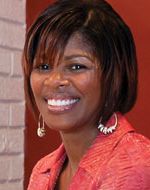Melanie Nix: Breast Cancer

I have been around breast cancer for most of my life. My mother was diagnosed with the disease when I was just eight years old. I also remember my grandmother being diagnosed with it when I was very young, and each of my three aunts has been affected by either breast cancer, ovarian cancer or both.
Given my family history, I knew I was at very high risk for developing breast cancer. After discussing this with my gynecologist in early 2008, he suggested that we needed to monitor my health much more aggressively and that I should begin by getting MRI screens rather than mammograms and by being tested for the BRCA gene mutations linked to breast and ovarian cancers.
I found out in July 2008 that I was BRCA-positive, with a mutation in my BRCA1 gene that was most likely handed down to me from my mother. An MRI in November of that year revealed an area of concern, and a subsequent biopsy showed that I had stage I breast cancer. Further, it was triple-negative breast cancer, a very aggressive form of breast cancer that disproportionately affects African American women and younger women.
I was just 38, a wife and a mother of two young children. For the best chance of long-term, cancer-free survival, I decided to have a bilateral mastectomy, so that in addition to having my left breast with the cancer removed, I also had my right breast removed to reduce my risk for the disease emerging again in the future. Then, after 16 rounds of chemotherapy and breast reconstruction surgery, I had both my ovaries removed (a prophylactic bilateral oophorectomy) to further reduce my risks for cancer in the future.
I sometimes regret not having been tested for the BRCA gene mutations sooner, but there were a few things that held me back. Some of it was fear and anxiety about my future insurability, but much of it was that I was pretty sure that if I tested positive, I would be aggressive in my approach to preventing disease and would opt for a preventive bilateral mastectomy and oophorectomy. In preparing to have and breast-feed my second child, I held off getting tested.
My BRCA status is often at the forefront of my mind because I know that I am going to have to explain it to my children, in particular my daughter, when they get a little older. When the time comes, I will need to educate her about her cancer risks and how to monitor her own health. I will also have to teach her about her options for preventing the disease – whether or not to be tested for the mutation and what to do if she is positive.
I am very fortunate to be an almost four-year cancer survivor. Although I have not had any treatments since those I received right after my diagnosis, I will be under the care of an oncologist for the rest of my life. Right now, I see him every six months. In an effort to keep my risks for further cancer as low as possible and to contain any side effects of my treatments, such as osteoporosis, in addition to conscientiously going to my doctors’ appointments, I exercise regularly, am very careful about my diet and take vitamin supplements.
As a result, I continue to thrive. I work with a childhood friend who was diagnosed with triple-negative breast cancer just before me to provide support and comfort for breast cancer patients who are going through treatment. I also volunteer with breast cancer advocacy and support organizations, because it is important that we raise awareness of this disease and the triple-negative form of it in particular. There is still so much to learn.